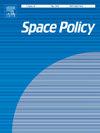Russia in Outer Space: A Shrinking Space Power in the Era of Global Change
IF 2
4区 社会学
Q2 INTERNATIONAL RELATIONS
引用次数: 0
Abstract
Since 2014, the Russian space sector has handled institutional rearrangement and external economic pressure. On the one hand, the establishment of the State Space Corporation Roscosmos intended to renovate a critical segment and save an industry that is one of the jewels of the Soviet legacy. On the other hand, the Russian annexation of Crimea triggered waves of financial and economic sanctions that crippled the country's access to space technologies and broader international cooperation in outer space. As a result of the dynamic, the Russian space program has been in a grey zone in recent years. On the eve of the war in Ukraine, the Russian government made a strategic choice for total decoupling from Western countries. The Russian decision stresses a trajectory already taken where space activities are increasingly becoming an instrument of deterrence. The military dimension increasingly defines the Russian space program, while LEO becomes an area for confrontation. To circumvent complete isolation in the international arena, Russia will attempt to maintain vigorous diplomatic actions to curb the technology desert and maintain vital space activities in the foreseeable future. Hence, this article aims to identify available tools that Russia may use to envision a new strategy in outer space. Considering the rupture between the West and Russia, we describe the long-term effects on the space industry. We finally highlight potential alternative cooperations that may allow Russia to build its space diplomacy around a network of peripheral states while the partnership with China remains restricted.
外太空中的俄罗斯:全球变化时代日益萎缩的太空大国
自2014年以来,俄罗斯航天部门应对了机构重组和外部经济压力。一方面,俄罗斯国家航天公司(Roscosmos)的成立旨在革新一个关键环节,拯救一个作为苏联遗产瑰宝之一的行业。另一方面,俄罗斯吞并克里米亚引发了一波又一波的金融和经济制裁,使俄罗斯无法获得空间技术,也无法在外层空间开展更广泛的国际合作。由于这种动态,俄罗斯的太空计划近年来一直处于灰色地带。在乌克兰战争前夕,俄罗斯政府做出了与西方国家全面脱钩的战略选择。俄罗斯的决定强调了已经采取的轨道,即空间活动日益成为威慑工具。军事层面越来越多地决定了俄罗斯的太空计划,而近地轨道成为一个对抗的领域。为了避免在国际舞台上完全孤立,俄罗斯将努力保持积极的外交行动,以遏制技术沙漠,并在可预见的未来维持重要的空间活动。因此,本文旨在确定俄罗斯可能用来设想外层空间新战略的可用工具。考虑到西方和俄罗斯之间的破裂,我们描述了对航天工业的长期影响。我们最后强调了潜在的替代合作,这可能使俄罗斯在与中国的伙伴关系仍然受到限制的情况下,围绕外围国家网络建立其太空外交。
本文章由计算机程序翻译,如有差异,请以英文原文为准。
求助全文
约1分钟内获得全文
求助全文
来源期刊

Space Policy
Multiple-
CiteScore
3.40
自引率
36.40%
发文量
40
期刊介绍:
Space Policy is an international, interdisciplinary journal which draws on the fields of international relations, economics, history, aerospace studies, security studies, development studies, political science and ethics to provide discussion and analysis of space activities in their political, economic, industrial, legal, cultural and social contexts. Alongside full-length papers, which are subject to a double-blind peer review system, the journal publishes opinion pieces, case studies and short reports and, in so doing, it aims to provide a forum for the exchange of ideas and opinions and a means by which authors can alert policy makers and international organizations to their views. Space Policy is also a journal of record, reproducing, in whole or part, official documents such as treaties, space agency plans or government reports relevant to the space community. Views expressed in the journal are not necessarily those of the editors or members of the editorial board.
 求助内容:
求助内容: 应助结果提醒方式:
应助结果提醒方式:


